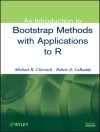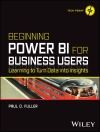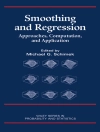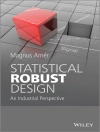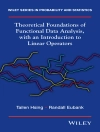Elicitation is the process of extracting expert knowledge about
some unknown quantity or quantities, and formulating that
information as a probability distribution. Elicitation is important
in situations, such as modelling the safety of nuclear
installations or assessing the risk of terrorist attacks, where
expert knowledge is essentially the only source of good
information. It also plays a major role in other contexts by
augmenting scarce observational data, through the use of Bayesian
statistical methods. However, elicitation is not a simple task, and
practitioners need to be aware of a wide range of research findings
in order to elicit expert judgements accurately and reliably.
Uncertain Judgements introduces the area, before guiding the
reader through the study of appropriate elicitation methods,
illustrated by a variety of multi-disciplinary examples.
This is achieved by:
* Presenting a methodological framework for the elicitation of
expert knowledge incorporating findings from both statistical and
psychological research.
* Detailing techniques for the elicitation of a wide range of
standard distributions, appropriate to the most common types of
quantities.
* Providing a comprehensive review of the available literature
and pointing to the best practice methods and future research
needs.
* Using examples from many disciplines, including statistics,
psychology, engineering and health sciences.
* Including an extensive glossary of statistical and
psychological terms.
An ideal source and guide for statisticians and psychologists
with interests in expert judgement or practical applications of
Bayesian analysis, Uncertain Judgements will also benefit
decision-makers, risk analysts, engineers and researchers in the
medical and social sciences.
Tabela de Conteúdo
Preface.
1. Fundamentals of Probability and Judgement.
1.1 Introduction.
1.2 Probability and elicitation.
1.3 Uncertainty and the interpretation of probability.
1.4 Elicitation and the psychology of judgement.
1.5 What use are such judgements?
1.6 Conclusions.
2. The Elicitation Context.
2.1 How and who?
2.2 What is an expert?
2.3 The elicitation process.
2.4 Conventions in Chapters 3 to 9.
2.5 Conclusions.
3. The Psychology of Judgement Under Uncertainty.
3.1 Introduction.
3.2 Understanding the task and the expert.
3.3 Understanding research on human judgement.
3.4 The heuristic and biases research programme. 3.4.6 Theaffect heuristic.
3.5 Experts and expertise.
3.6 Three meta theories of judgement.
3.7 Conclusions.
4. The Elicitation of Probabilities.
4.1 Introduction.
4.2 The Calibration of Subjective Probabilities.
4.3 The calibration in subjective probabilities: theories andexplanations.
4.4 Representations and methods.
4.5 Debiasing.
4.6 Conclusions.
5. Eliciting Distributions – General.
5.1 From probabilities to distributions.
5.2 Eliciting univariate distributions.
5.3 Eliciting multivariate distributions.
5.4 Uncertainty and imprecision.
5.5 Conclusions.
6. Eliciting and Fitting a Parametric Distribution.
6.1 Introduction.
6.2 Outline of this chapter.
6.3 Eliciting opinion about a proportion.
6.4 Eliciting opinion about a general scalar quantity.
6.5 Eliciting opinion about a set of proportions.
6.6 Eliciting opinion about the parameters of amultivariate normal distribution.
6.7 Eliciting opinion about the parameters of a linearregression model.
6.8 Eliciting opinion about the parameters of a generalizedlinear model.
6.9 Elicitation methods for other problems.
6.10 Deficiencies in existing research.
6.11 Conclusions.
7. Eliciting Distributions – Uncertainty and Imprecision.
7.1 Introduction.
7.2 Imprecise probabilities.
7.3 Incomplete information.
7.4 Summary.
7.5 Conclusions.
8. Evaluating Elicitation.
8.1 Introduction.
8.2 Scoring rules.
8.3 Coherence, feedback and overfitting.
8.4 Conclusions.
9. Multiple Experts.
9.1 Introduction.
9.2 Mathematical aggregation.
9.3 Behavioural aggregation.
9.4 Discussion.
9.5 Elicitation practice.
9.6 Research questions.
10. Published Examples of the Formal Elicitation of Expert Opinion.
10.1 Some applications.
10.2 An example of an elicitation interview – eliciting enginesales.
10.3 Medicine.
10.4 The nuclear industry.
10.5 Veterinary science.
10.6 Agriculture.
10.7 Meteorology.
10.8 Business studies, economics and finance.
10.9 Other professions.
10.10 Other examples of the elicitation of subjectiveprobabilities.
11. Guidance on Best Practice.
12. Areas for Research.
Glossary.
Bibliography.
Author Index.
Index.
Sobre o autor
Professor Anthony O’Hagan is the Director of The
Centre for Bayesian Statistics in Health Economics at the
University of Sheffield. The Centre is a collaboration between the
Department of Probability and Statistics and the School of Health
and Related Research (Sc HARR). The Department of Probability and
Statistics is internationally respected for its research in
Bayesian statistics, while Sc HARR is one of the leading UK centres
for economic evaluation.
Prof O’Hagan is an internationally leading expert in
Bayesian Statistics.
Co-authors:
Professor Paul Gathwaite – Open University, Prof of
Statistics, Maths and Computing
Dr Jeremy Oakley – Sheffield University
Professor John Brazier – Director of Health
Economics Group, University of Sheffield
Dr Tim Rakow – University of Essex, Psychology
Department
Dr Alireza Daneshkhah – University of Sheffield,
Medical Statistics Department
Dr Jim Chilcott – School of Health Research, University
of Sheffield, Department of OR






